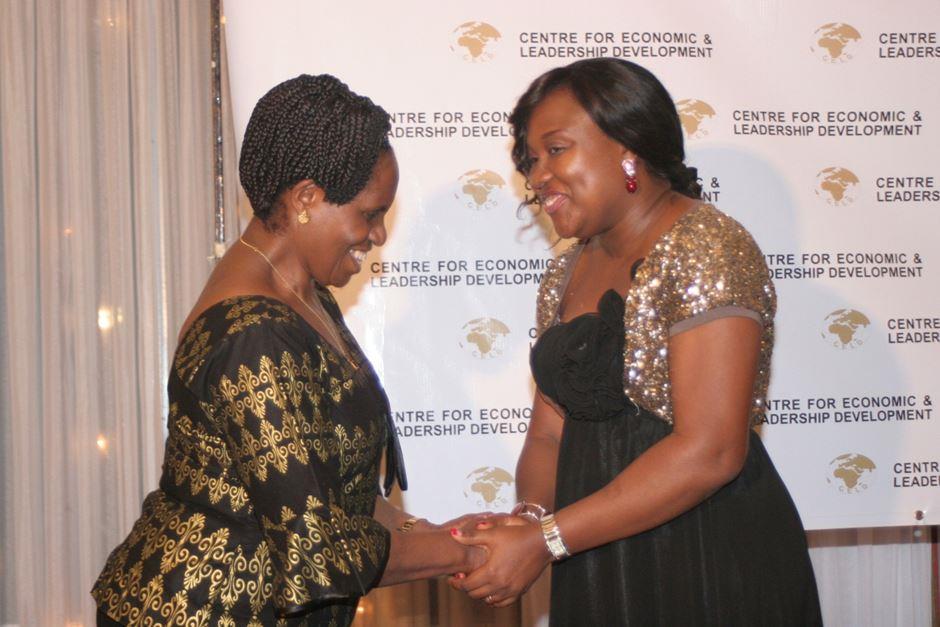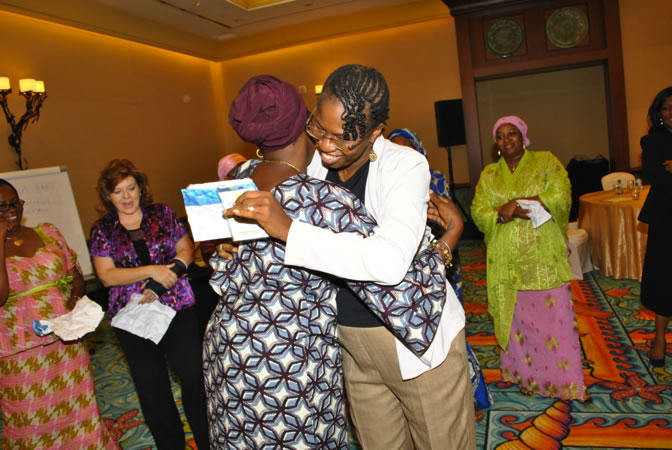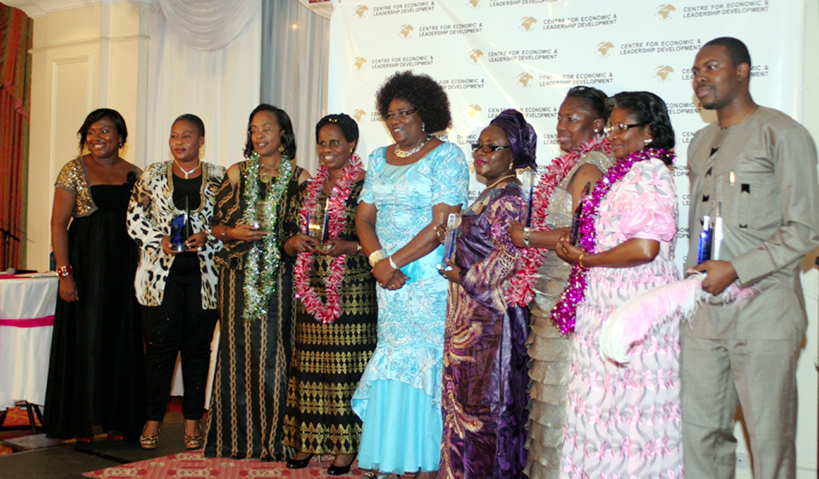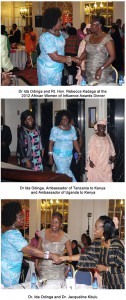- Contact Us
- +447471066570
- info@celd.org.uk

Photos: 2012 All Africa Women Leaders’ Summit
November 21, 2012
Women Leadership Development Training Program – July 2013
July 8, 2013
From 21-24 November, 2012, CELD successfully held her 2nd All Africa Women Leaders’ Summit at the Hilton, Nairobi-Kenya.

From 21-24 November, 2012, CELD successfully held her 2nd All Africa Women Leaders’ Summit at the Hilton, Nairobi-Kenya.
Communique of the 2012 All Africa Women Leaders’ Summit, Nairobi-Kenya On
The role of women leaders in reducing the vulnerability of the female adolescent and leaders of household in Africa. (22-24 November- 2012)
The All African Women leaders’ summit is convened annually by Centre for Economic and Leadership Development (CELD)to discuss and proffer solutions to salient issues that is threatening the existence of women and children of Africa, who happen to be the most vulnerable sets of people.
This years summit with the theme” The role of female leaders in reducing the vulnerability of the female adolescent and heads of household in Africa held at the Hilton hotel Nairobi and in attendance were women leaders from different sectors across Africa who came together to discuss and proffer solutions to the diverse but related issues concerning the vulnerability of the girl-child, female heads of household, and the burden of care that rest on females.
The Summit started with an opening ceremony, with a welcome address presented by the Executive Director of CELD, where she welcomed all delegates to the All Africa Women Leaders’ Summit 2012, Nairobi Kenya. She stated that the theme of the summit- The role of Women Leaders’ in reducing the vulnerability of the female adolescent and heads of households in Africa; was carefully chosen because todays girls are tommorows women, and that girls cannot advance without the advancement of women. She therefore called on all African women leaders from all spheres of live to work together to protect the future of girls against all of the ills being faced by young African girls ranging from rape, low school enrolment, selective abortion, HIV/AIDS to female genital mutilation, citing Kofi Annan when he said “There is no tool for development more effective than the education of girls. No other policy is more likely to raise economic productivity, lower infant and maternal mortality and promote health”.
In her keynote address, the Vice President of Zimbabwe, Hon. Joice Mujuru who was represented by their Ambassador to Kenya, focused on the importance of education and inclusiveness of women in the governance process as key to Africa’s future. She also harped on the need for women to commit to improving their skills, so their selection for leadership position is on merit and so they are able to know how to deliver on expectations, efficiently.
In her paper Education: Key to Empowering African Girl Child to lead, Prof. Comfort M. Ekpo of University of Uyo, Akwa Ibom State emphasized the need for education as an instrument of development in any nation. It is the right of every child irrespective of sex or culture. Education leads to empowerment, because it is knowledge that empowers.
Her paper drew attention to the common wealth plan of action for gender equality which set 2015 as the deadline to have all women occupy a third of decision making posts as the global partnership for development. She used this point to reiterate the importance of girl child education as women cannot be in leadership positions tomorrow except they are educated today.
In the sub-topic: Girl Child: Her make and worth, Prof. Ekpo explained why the girl child’s potentials are often not utilized or under-utilized. Factors include religion, traditions, and cultures, socio-political and economic practices of different countries of the world.
She identified 3 types of girl child based on existing discriminatory conditions which include
- Girl child conditioned by religious discriminations
- Girl child conditioned by traditional/ cultural discriminations
- Girl child conditioned by socio political as well as economic discriminations
In all these three conditions, Prof. Ekpo identified education as the only source of liberation for the girl child.
There followed a panel discussion on the theme where participant from Kenya NGOs, Action Now, Kenya, the Central Bank of Nigeria, Directors from various government ministries, the Academia and a female diplomat from the Zimbabwean embassy shared personal experiences and views highlighting the challenges still being faced by women and girls today and identifying education, confidence, unity of women, access to information and finance as tools for developing the woman to make her effective in providing succor and direction to the girl child.
Some NGOs presented reports on what their organizations are doing in respect to the theme, and the first day of the summit was rounded up with a presentation by an openly HIV positive woman on the issues of stigmatization, as a societal evil, and capped with a video presentation on cases of malicious Sterilization of women living with HIV / Aids in government hospitals in Kenya, prompting delegates to call on Government to look into this allegations
Other Presentations are as follows:
Promoting peaceful coexistence and respect for diversity by the association of Muslim Patrons
From this presentation, it was discovered that:
120 underage girls from Bahari district Kilifi County dropped out of school this year due to pregnancies resulting from defilement.
Men who engage in sex with the young girls especially in Kilifi and Tana River mostly capitalize on the poverty facing the girls’ families and offer them some money and food.
Women and children live in camps in the Tana River – Coast Province after forceful eviction by men of opposite tribes. 12,000 persons were displaced during the ethnic clashes and more than 300 houses razed down. The aftermath of the violence was; women and children suffering. During the two months violence women were raped, girls were forced to have sex for food, until date, there are girls in Tana Delta who did not sit for their exams and their whereabouts are still unknown
The presentation also buttressed on Female Genital Mutilation and the serious complications that stem from it, which could be protracted and result in long term anaemia as well as reduced urinary retention.
Action Points
- Women leaders should conduct frequent community visits and give guidance to both parents and children.
- Women Leaders should work with the relevant authorities to help women get their rights and understand court procedures.
- Women Leaders should consistently engage Women and Girls on the dangers of FGM and dispel the myth that FGM is a religious act.
- Women from the County Assemblies; the National Assembly; the House of Senate and hopefully from the State House should speak out until FGM is totally erased from the African Culture
HIV SITUATION AMONG ADOLESCENTS IN AFRICA
Action Points
- Women Leaders should design Prevention programs to prevent New infections such as- Prevention with Positives (PWP) among youth in schools and out of school; Prevention of Mother to Child Transmission of HIV (PMTCT) among young mothers. ; Voluntary Counseling and Testing (VCT); Condom demonstration and distribution; Family planning Individual Counseling ; Nutritional Support; Home and Community Based Care; Sanitary towel project; Trauma Counseling for victims of GBV; OVC Support; and the building of a Safe House for adolescent girls who are thrown out of the home by reason of their status.
The Executive Director of the Gender Violence Recovery Centre, Grace Wangechi, gave insightful presentations on Child Domestic Workers and Female Adolescent Aggression- the cycle of victimization.
In her presentation, she identified the different forms of abuse to include- domestic, physical, verbal, economic and psychological abuse. It also identified other emerging forms to include violence resistance cases and mutual violence control. Female adolescent aggression can be both physical and relational aggression (such as gossiping, arguing, name calling and psychological manipulation) more than physical aggression. The effects include depression and many other behavioral problems. The interventions include;
- Expose girls to positive social situations where they can learn how to interact with their peers in constructive and reasonable ways
- Ensure that a caring adult is present and can role model adolescent girls
- Help girls feel connected to their schools and local communities by engaging them in activities, such as organized sports, Girl Scouts, or community volunteer programs amongst others.
Child domestic workers (CDW) (i.e. children in domestic labor) are people under the age of 18 who work in households of people other than their closest family doing domestic chores, caring for children, running errands and sometimes helping the employer run a small businesses from home. This includes children who are paid for their work, as well as those who are not paid or who receive ‘in-kind’ benefits, such as food and shelter.
Many child domestic workers are found in very exploitative, slave-like conditions. These children are highly isolated, due to their invisibility behind closed doors and the failure of existing regulatory mechanisms to protect them
Some of the vulnerabilities are:
• Exposure to physical, psychological and sexual abuse
• Vulnerability to trafficking
• Lack of opportunities for education
• Exposure to harmful and hazardous working conditions
The way forward
The women in attendance agreed that, it is critically important for policy-makers to enable national laws as
- Domestic work falls outside most labor legislation in many countries, thus domestic workers are unable to access their rights.
- The non-recognition of domestic work as legitimate work combined with the hidden nature of the worksite results in exploitative living and working conditions.
Reports of abuse are many, with workers facing, among other things, extremely long hours of work, absence of rest and leave periods, deprivation of food and adequate shelter, delayed or non-payment of wages, wage deductions for dubious debt, and physical and sexual violence. Mrs. Furo Giami the executive director of CELD expressed the hope that
- Governments and employers should be mobilized to provide decent working conditions especially to adult domestic workers.
- Special registration schemes should be established to encourage access to social security, raise worker awareness about their rights, create opportunity for fair mediation, and allow for days off and participation in self-organizing activities.
- Work contracts are encouraged to formalize the relationships between domestic workers and their employers. More efforts are focused in monitoring hours of work and rest, access to schooling, and access to social benefits and facilities.
Another insightful presentation was delivered by Janipher Otieno of the NYANZA COUNTIES EMPOWERMENT & DEVELOPMENT FOUNDATION.
She gave a Situation Analysis on KENYA, stating that Kenya lags behind in:-
- Balanced Administrative set-up, Land use & ownership
- Millennium Development Goals (MDGs):
- The recent food shortage and global inflation exacerbated the already lackluster pace of advancement
- Fundamental development disparities exist among regions with Western Kenya, Nyanza Province, performing the poorest in all the indicators
The overall message of the summit emphasized education as the best and sustaining way to empower the girl child.
Book donation-
one Girls High school, Local District clinic-two bed, Skills training for Youth, Auto mechanic, incorporating and involvement of a Local elders council, Handing over project to community and Rewarding hard work, designing an Orphans with mentors program, with attendant gifts and Teen aged orphans-Sanitary Gifts and Women Empowerment projects.
She further called on major partnerships in the following areas-
- Agriculture : Agribusiness – crops. Machinery& Equipment
- Manufacturing: Food processing; Cement; Salt; Sugar ; Solar panels; Electronics; Automobiles; Copper products; gold products; glass products etc.
- Real Estate : Homes in the Counties and District Headquarters.
- Natural Resources: Mineral Mining ; Fish
- Transportation : By:- Road , Air & Water
- Infrastructure: Railroads; Roads & Bridges
- Energy : Electrification(Lighting) ; Solar power; Wind & Hydro
- Education: Schools & Colleges; Technical Training; Universities.
- Business and Trade .
The Honourable Speaker of the Parliament of Tanzania, Rt. Hon. Anne Makina, who was present at the summit with a team of MPs from the Parliament of Tanzania; gave a presentation on: The state of Food Insecurity in Africa: Its Implication for Vulnerable Children and the Intervention of Women Leaders.
Defining food security as a situation when all people at all times have access to sufficient, safe, nutrition food to maintain a healthy and active life, she reiterated that Food security is therefore built on three pillars:
- Food availability: sufficient quantities of food available on a consistent basis.
- Food access: having sufficient resources to obtain appropriate foods for a nutritious diet.
- Food use: appropriate use based on knowledge of basic nutrition and care, as well as adequate water and sanitation.
Causes of Food Insecurity in Africa
Stating that a report on the State of Food Insecurity in the World has shown that the number of undernourished people in Africa is now 224 million caused by a number of factors include:-Drought and other extreme weather events; Pests, livestock diseases and other agricultural problems; Climate change/environmental degradation; Military conflicts; Lack of emergency plans; Corruption and political instability; Cash crops dependence; AIDS; Rapid population growth.
Madam Speaker emphasized on the point that Children, who need a nutritious diet to lead a healthy life, are greatly affected by this precarious situation, further stating the fact that the most important period in a child’s life is the first 1000 days between conception and two years, when the child is growing most rapidly. Insufficient intake of nutrients during this time weakens the immune system and makes children more vulnerable to severe and life-threatening diseases. It permanently damages their brain development, impairing their ability to learn and do well at school. And it stunts their growth, making them less able to do physical work as adults and earn a decent living.
More facts also show that Four out of ten children in Africa have stunted growth, a clear sign that they have not been able to consume sufficient nutritious food. These children will not get a second chance for a healthy and productive life because the damage inflicted in the early years is largely irreversible.
In a conclusive statement, Rt. Hon. Anne Makinda gave her views on the the Role of Women Leaders in combating this threat to the existence of Africa, as follows:
- As women leaders it is vital that we ensure that women farmers and their children benefit from the agricultural advances that are taking place throughout the continent.
- There is no blueprint for closing the gender gap in agriculture but the basic principles are clear. As women leaders, we must use our collective influence to eliminate all forms of discrimination against women under the law, ensure that access to resources is more equal, ensure that agricultural policies and programmes are gender sensitive and make women’s voices heard in decision making at all levels.
- Laws need to be reformed to guarantee equal rights of men and women to control over land, and government officials and community leaders should be held accountable for upholding them. Women should be made aware of their rights and how to claim them, and be included in the implementation of land programmes. In Tanzania, for example, the village land councils that settle land disputes comprise seven members of which three must be female.
- Women should have preferential access to technologies and extension services so that they are able to increase agricultural productivity. Investments in labour-saving technologies are especially needed to reduce their workload. Less work in the field means more free time to attend to the needs of their children and themselves.
- Special efforts are also needed to enhance the financial literacy of women, and improve their access to microcredit and other financial services that meet the specific needs of women farmers.
- We must also continue to challenge the social norms that threaten women’s ability to take decisions that are in the best interests of themselves and their young children. A very large body of research confirms that when women control income, including the income from the sale of farm products, they spend more of it than men on food, health, clothing and education for their children. And better fed, healthier children learn better and become more productive citizens.
- Moreover, we must ensure that investments reach the most marginalized and vulnerable communities where food insecure households and undernourished women and children are concentrated. Greater focus in these communities will accelerate our progress towards reducing malnutrition.
Lastly, she stated that women leaders must be innovative by devising solutions that suit our local environment and as an example, gave her own experience as follows- By the year 1995 cases of pupils’ dropout from school and absenteeism were very widespread in my constituency because of hunger and denial of food by parents. This impacted negatively on their performance at school. So, what we did was to sensitize parents on the need to prepare something for their children in the morning before they go to school. Besides, we introduced school feed programs in the afternoon. Within a short span of time the results were amazing! Pupils Attendance in schools rose sharply to 95 percent. And performance in examinations improved markedly.
The summit ended with the All Africa Women of Influence Awards/Dinner with the Chief Host of the summit, Wife of the Prime Minister of Kenya, Her Excellency Dr. Ida Odinga, giving the welcome address, followed by keynote address by Rt. Hon. Rebecca Kadaga, Speaker of the Parliament of Uganda. Guests were treated to an evening of glamour and fun in the spirit of unity with a common goal- the celebration of the achievements of great amazons of Africa.
The following African Women of Influence and Repute received awards in various categories:
- RT. HON. REBECCA A. KADAGA, The Speaker of the Parliament of Uganda;
- RT. HON. ANNE S. MAKINDA (MP), The Speaker of the National Assembly of Tanzania;
- HON. MULIKAT AKANDE-ADEOLA, The House Leader, House of Representatives of the Federal Republic of Nigeria;
- MRS ROSEMARY OKELLO- ORLALE; The Executive Director, African Woman & Child Feature Service;
- PROFESSOR COMFORT M. EKPO, The Vice Chancellor, University of Uyo, Nigeria;
- RT. HON. CHINWE CLARE NWAEBILI ( ADAUGO), The Honouable Speaker, Anambra State House of Assembly, Nigeria;
- MRS LARA BANJOKO, Chief Operating Officer, SPOG Petrochemicals Ltd.; Dr. Jacqueline Kitulu, a renowned family physician in Kenya


